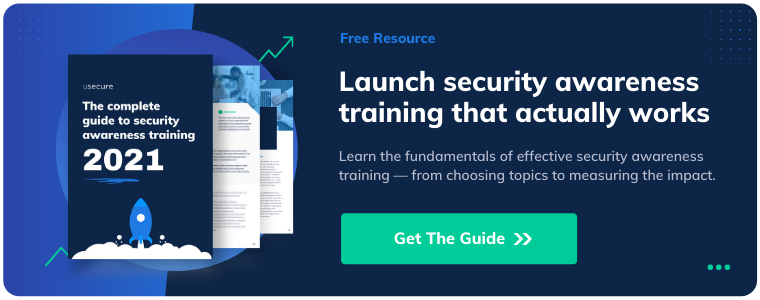What should security awareness training include?
More and more companies are waking up to the fact that security awareness training is essential to combat the modern cyber threat landscape.
Training is key to helping end users be less vulnerable to threats like phishing and ransomware, but what you include in your training programme can make the difference between actually protecting your company from a real threat and simply blasting your end users with information on best practices.
In this article, we'll go through what the best security awareness training programmes should include:
What topics should you include?
In the past, cyber awareness training usually consisted of one lecture for the entire staff that attempted to cover as many bases as possible. As a result, too much information was gone through in too short a time and end users would remember little of what they were supposed to have learnt.
Now, cloud-based security awareness training solutions allow you to ensure that each employee is trained in core security areas, but also receive training on specific topics that might be applicable to them. For example, users working remotely may need training on VPN use, and users who come into the office may need additional training on physical security measures.
For a full list of the important topics you should cover, read our blog on the 12 most important security awareness topics in 2020.
Video- or slide-based content?
Not all content is the same when it comes to keeping your end users engaged. Lecture-based sessions with slideshows are unlikely to let you maintain the interest of end users for a whole hour-long session, and online training based solely on text slides is not going to do the trick either.
Videos allow you to present information in an engaging format, using a story that is relatable to your end users and one that they are actually going to remember. While text-based slides are still the best for getting across larger volumes of information, integrating some video content into your training will help ensure that your end users won't despair at the idea of their next training session.
When should you carry out training?
Unlike computers, information you give to humans is not going to just stick there forever (or in many cases, even a while). Ensuring that your end users actually remember the information they learn in their security awareness training programme is best done by using the two keys of learning. The first of these is making training relatable and visually engaging, which is touched on in the section above. The second key is repetition.
If your end users only take part in security awareness training once a year, you'll probably get a couple of weeks of security awareness in a year, if even that. If you want to keep your end users on the alert against cyber threats, and informed of the best practices in their day-to-day work, you are going to need to make training regular. By splitting training into short, monthly sessions, you keep your end users alert of cyber threats, while educating them on all important security areas without overwhelming them at once.
Why you should include simulations
Any type of education is best combined with testing. Being tested on things you've just learnt helps improve retention - and helps the organisation assess how big of an impact the training has made.
Including phishing simulations in your security awareness training programme will help you know how exposed your end users are to phishing, and how their reactions have improved as a result of their training. Being compromised in a simulated phishing attack is also likely to prove as a demonstration equal to no other in showing your end users how easy it is to fall for a scam.
Combining training with cultural change
Security awareness training isn't enough to stop threats like phishing and ransomware by itself. It is important that cyber training is part of a security culture, where end users are encouraged to discuss and bring up cyber threats. By including the right things in your security awareness programme and fostering a secure culture, you will set up your organisation to succeed in defending itself against the modern threat landscape.
Get started with the one-stop security awareness platform
Having a platform that offers automated training and simulations, and includes video-based content that will truly engage your end users, is essential for delivering real improvements in human security.
usecure is your one-stop shop for addressing human error in your organisation. Train your users with our automated cloud-based training courses that are personalised to address each individuals' weak points, and carry out regular phishing simulations with our best-in-class simulated phishing tool.
Learn more about launching effective phishing and security awareness training with usecure's free 2021 guide below, or try usecure's security awareness training courses with a free 14-day trial.


.png)